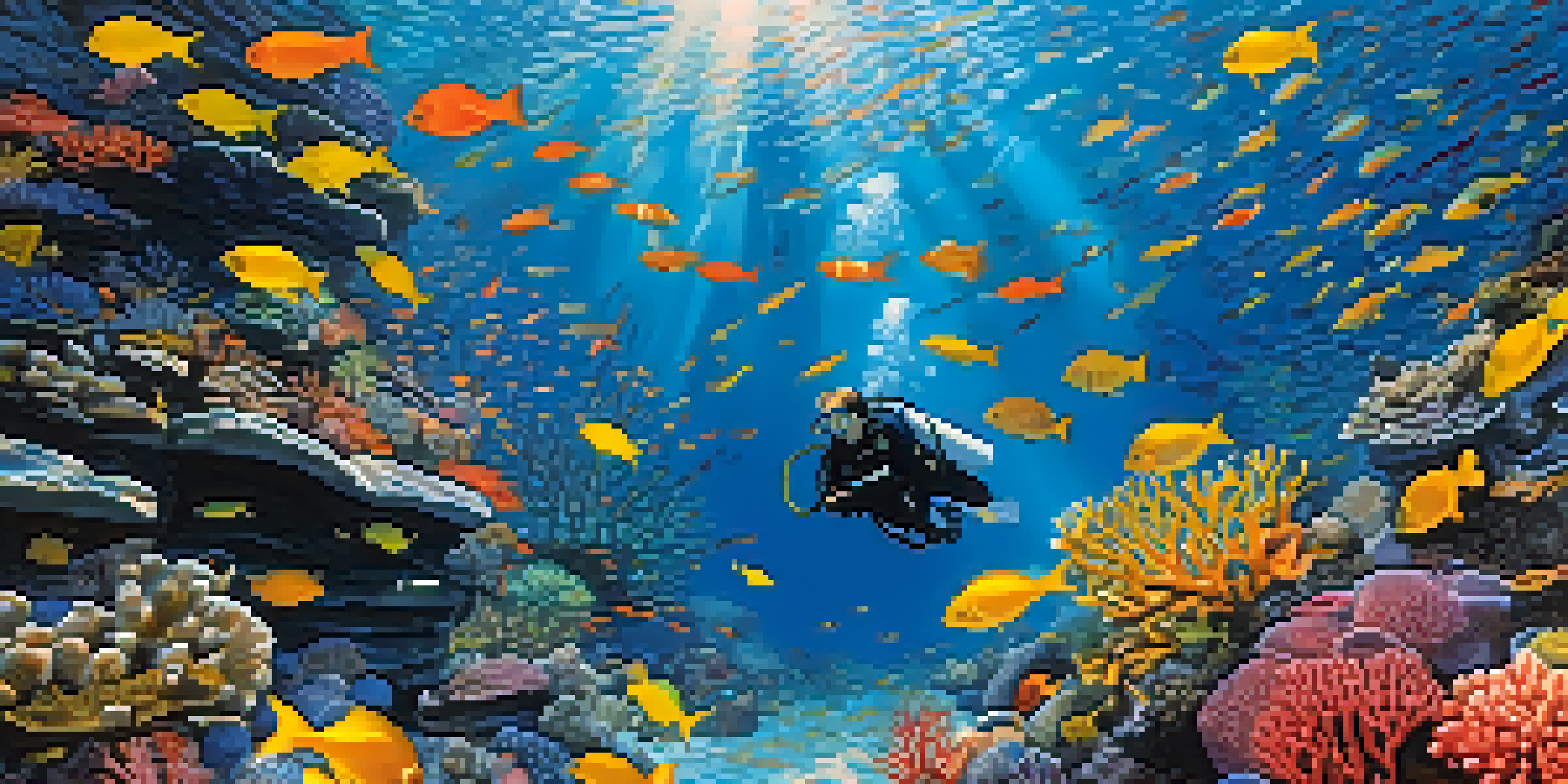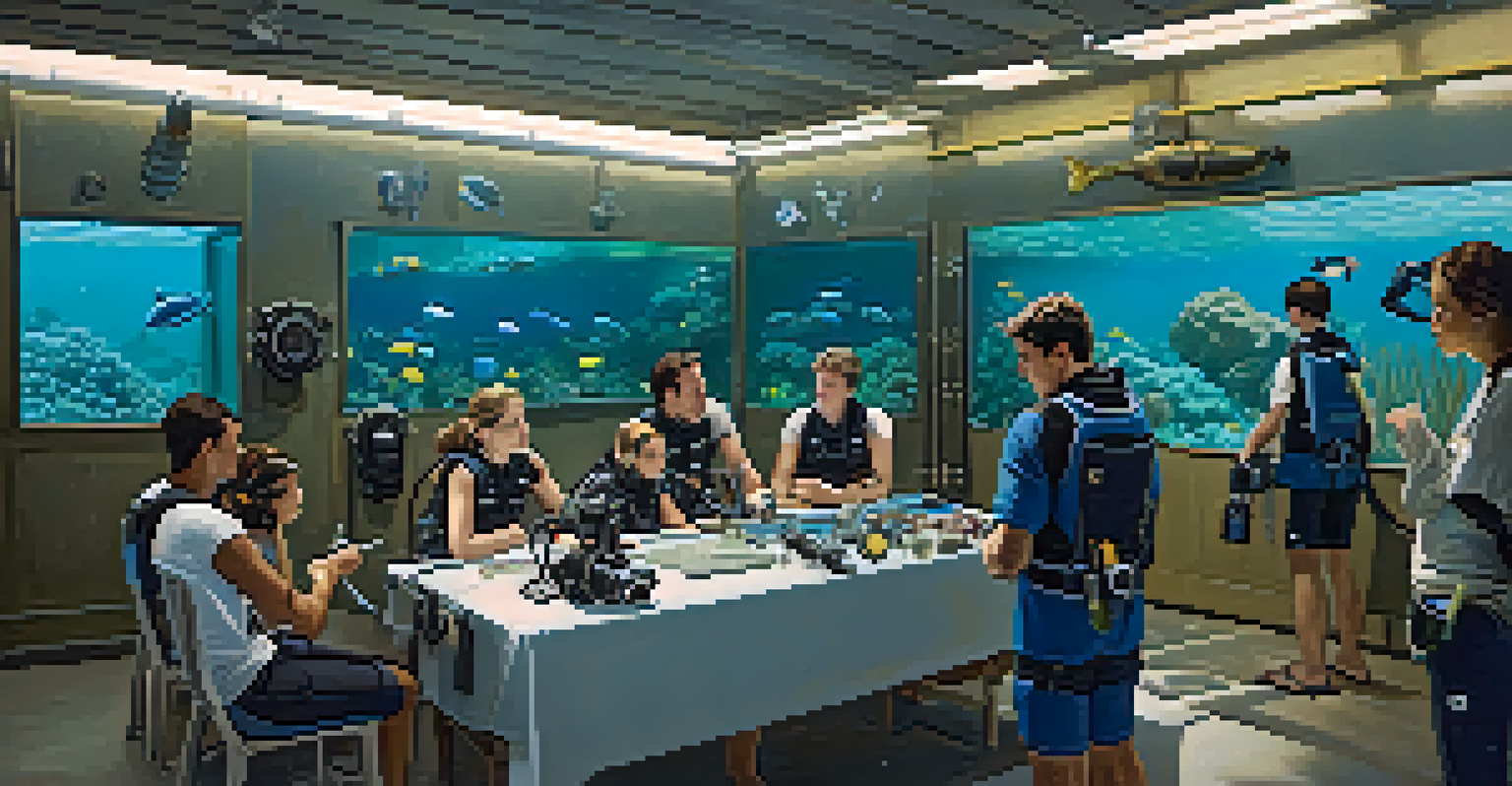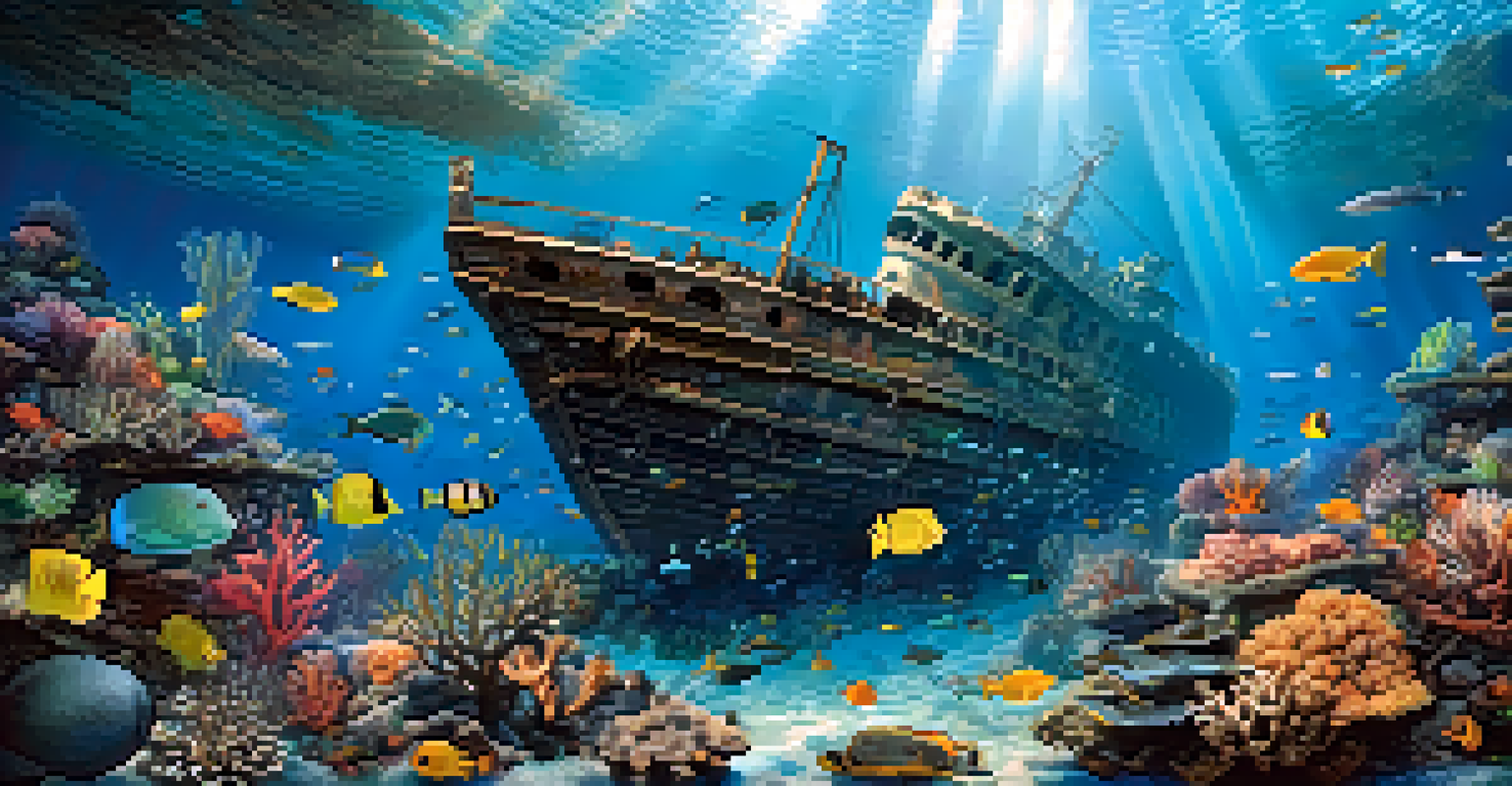The Importance of Scuba Diving Training and Education

Understanding the Basics of Scuba Diving Training
Scuba diving training provides foundational knowledge about the equipment, the underwater environment, and safety protocols. It's essential for divers to understand how their gear works, including tanks, regulators, and buoyancy control devices. This knowledge not only enhances the diving experience but also ensures divers can respond effectively to emergencies.
The ocean stirs the heart, inspires the imagination, and brings eternal joy to the soul.
Moreover, training helps divers learn the principles of physics and physiology related to diving. For instance, understanding buoyancy, pressure changes, and how to equalize ear pressure can make a significant difference in a diver's comfort and safety. These concepts are not just theoretical; they're practical skills that come into play every time a diver descends into the water.
In essence, the basics of scuba diving training lay the groundwork for a safe and enjoyable diving experience. Just like learning to ride a bike, having a strong foundation allows divers to explore the underwater world with confidence and skill.
Safety First: The Core of Scuba Diving Education
Safety is paramount in scuba diving, and effective training emphasizes this from the start. Courses teach divers how to assess risks, manage their air supply, and recognize the signs of potential problems underwater. By understanding these safety protocols, divers can minimize risks and react appropriately in emergencies.

Additionally, training often includes simulated emergency scenarios, allowing divers to practice their responses in a controlled environment. This hands-on experience is invaluable; it helps build muscle memory and ensures that divers know what to do if something goes wrong. The more prepared a diver feels, the more enjoyable their underwater adventures will be.
Safety is Key in Diving Education
Effective scuba diving training prioritizes safety protocols and risk assessment to ensure divers can handle emergencies.
Ultimately, scuba diving education is about fostering a culture of safety. It empowers divers to take responsibility for their well-being and that of their fellow divers, making the underwater world a safer place for everyone.
Skill Development: Gaining Confidence Underwater
One of the most rewarding aspects of scuba diving training is the skill development it offers. From mastering buoyancy control to navigating underwater, each skill learned adds to a diver's confidence. This gradual buildup of skills transforms novice divers into capable underwater explorers.
To me, the sea is a continual miracle; The fishes that swim - the rocks - the motion of the waves - the ships - the men - the sea itself, is a miracle.
As divers progress through training levels, they gain access to more advanced techniques and dives. For instance, learning how to dive in different environments or at varying depths opens up new opportunities for exploration. Each new skill not only enhances the diving experience but also instills a sense of accomplishment.
In short, skill development through scuba diving training is akin to leveling up in a game. Each achievement builds confidence and prepares divers for the next challenge, whether it's diving in a coral reef or exploring a shipwreck.
Environmental Awareness: Protecting Our Oceans
Scuba diving training goes beyond personal safety; it also fosters a deep respect for the underwater environment. Many courses incorporate lessons on marine conservation and the importance of protecting fragile ecosystems. This awareness encourages divers to become stewards of the ocean.
By understanding the impact of human activities on marine life, divers are inspired to take action. Whether it's minimizing plastic use or participating in underwater cleanups, trained divers often feel a responsibility to protect the environments they explore. This sense of duty can lead to a community of environmentally conscious divers.
Skill Development Boosts Confidence
As divers progress through training, they gain essential skills that build their confidence and prepare them for new underwater challenges.
In conclusion, scuba diving education equips individuals with the knowledge to appreciate and protect the ocean. It instills a sense of responsibility that extends beyond the dive, creating advocates for ocean conservation.
Community and Connections: Building Relationships Through Diving
Joining a scuba diving course is an excellent way to meet like-minded individuals who share a passion for the ocean. Training classes often foster a sense of camaraderie among participants, creating friendships that can last a lifetime. These connections enhance the diving experience, making it more enjoyable and fulfilling.
Moreover, being part of a diving community can lead to valuable networking opportunities. Divers can share tips, experiences, and even plan trips together, turning individual pursuits into collective adventures. This sense of belonging creates a supportive environment where divers can grow and learn from one another.
In essence, scuba diving training is not just about skills; it's about building a community. The relationships formed during training can enhance the overall diving experience, making every dive more memorable.
Continuing Education: Lifelong Learning in Diving
Scuba diving education doesn't stop after completing a basic course; it's an ongoing journey. Many divers pursue advanced certifications, specialty courses, and even instructor training to deepen their knowledge and skills. This commitment to lifelong learning keeps divers engaged and excited about their underwater adventures.
Continuing education also opens up new opportunities for divers. From wreck diving to underwater photography, advanced courses allow divers to explore various aspects of the underwater world. Each certification adds a new dimension to their diving experience, encouraging exploration and personal growth.
Community Builds Lasting Connections
Scuba diving training fosters camaraderie among participants, creating friendships and a supportive community that enhances the diving experience.
In summary, the path of scuba diving education is ever-evolving. Embracing continuous learning ensures that divers remain informed, skilled, and ready for new challenges in the water.
The Role of Technology in Scuba Diving Education
In today's digital age, technology plays a significant role in scuba diving education. Online courses, virtual simulations, and diving apps enhance the learning experience and make diving more accessible than ever. These tools provide divers with resources to prepare for their underwater adventures, no matter where they are.
Additionally, advancements in diving equipment technology have revolutionized the sport. From dive computers that track depth and time to underwater cameras capturing stunning marine life, these innovations enhance both safety and enjoyment. Understanding how to use this technology effectively is an essential part of modern scuba training.

Ultimately, technology enriches scuba diving education, offering divers new ways to learn and connect with the underwater world. It keeps the experience fresh and exciting, allowing divers to embrace the wonders of the ocean with confidence.
Scuba Diving Training: A Gateway to Adventure
Scuba diving training is not just about safety and skills; it opens the door to incredible adventures. Once trained, divers can explore breathtaking underwater landscapes, encounter vibrant marine life, and even discover historical shipwrecks. Each dive offers a unique experience that can ignite a lifelong passion for the ocean.
Moreover, diving provides opportunities for travel and exploration. Whether it's diving in the Great Barrier Reef or the clear waters of the Caribbean, trained divers can venture beyond their local waters. This sense of adventure often leads to unforgettable memories and stories to share.
In conclusion, scuba diving training is the first step toward a world of exploration and adventure. It empowers individuals to dive into new experiences, making the ocean's wonders accessible to all.